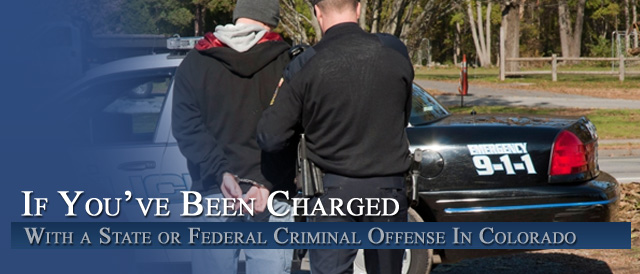


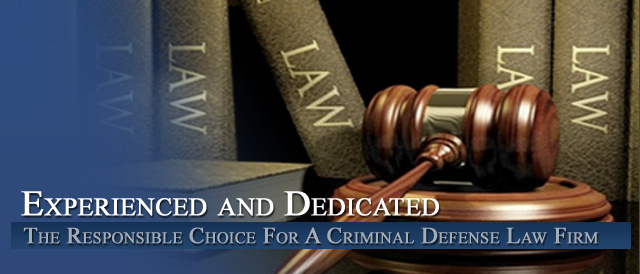
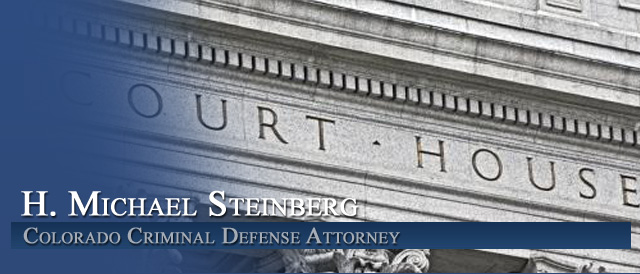
Colorado Criminal Law – How Anger At A Witness Can Quickly Escalate Into A Felony Charge
By H. Michael Steinberg Colorado Criminal Defense Lawyer Attorney
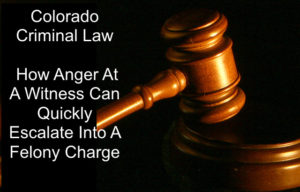 Colorado Criminal Law – How Anger At A Witness Can Quickly Escalate Into A Felony Charge – The emotional swings of anger and fear that accompany being charged in the criminal justice system can result in a loss of control that can quickly escalate into actions of revenge. There are several different felonies that can be charged in this situation – this article addresses the crime of Retaliation Against A Witness Section 18-8-706 of the Colorado Revised Statutes.
Colorado Criminal Law – How Anger At A Witness Can Quickly Escalate Into A Felony Charge – The emotional swings of anger and fear that accompany being charged in the criminal justice system can result in a loss of control that can quickly escalate into actions of revenge. There are several different felonies that can be charged in this situation – this article addresses the crime of Retaliation Against A Witness Section 18-8-706 of the Colorado Revised Statutes.
Understanding The Crime Of Retaliation Against A Witness Under Section 18-8-706
To understand the crime of Retaliation Against A Witness under Section 18-8-706 the reader would have to look at the crime itself. Retaliation against a witness depends on a witness’s relationship to a criminal proceeding.
Section 18-8-706 provides that a person commits retaliation against a witness or victim:
When laws are created, the Colorado State Legislature holds hearings to draft those laws. Those hearings and the materials developed during those hearings are called the legislative history of a law. When the Retaliation law was enacted the Colorado General Assembly stated that the law was intended to protect persons who are or are believed to be witnesses in criminal proceedings and to protect the administration of criminal justice because witnesses are indispensable participants in our criminal justice system.
Crimes Are Broken Down Into Their Elements
Retaliation Against a Witness or Victim
The elements of the crime of retaliation against a witness or victim are:
1. That the defendant,
2. in the State of Colorado, at or about the date and place charged,
3. used a threat, an act constituting the crime of harassment, or an act of harm or injury upon any person or property,
4. directed to, or committed upon, a witness or victim to any crime, an individual whom the defendant believed had been or would be called to testify as a witness or victim, a member of the witness’s family, a member of the victim’s family, an individual in close relationship to the witness or victim, or an individual residing in the same household with the witness or victim,
5. as retaliation or retribution against the witness or victim.
Defining Some Of The Key Terms In Colorado’s Retaliation Against a Witness or Victim
What Is The Definition Of A Witness Or Victim Included In The Law?
Once again, Section 18-8-706, applies only to retaliation against a witness because of the witness’s relationship to a criminal proceeding.
The “protected persons” included in the law are not only:
- a witness or a victim to any crime, but also
- an individual whom the Defendant believes has been or would have been called to testify as a witness or a victim,
- a family member of “the” witness or victim, and
- a person in a close personal relationship or in the same household as “the” witness or victim.
§ 18-8-706 .
Law Contains No Definition Of A “Threat”
The phrase in the law “used a threat, an act constituting the crime of harassment, or an act of harm or injury upon any person or property,“ is a broad warning to anyone considering an act of retaliation against a victim or witness in a criminal case.
While the term “threat” is not defined by the statute, it has been read to mean a construed threat – an expression of an intent or statement of purpose to commit harm or injury to another’s person, property, or rights through the commission of unlawful acts.
The Definition Of A “Witness – Victim” Of The Retaliation – Is Also VERY Broad
According to the general definitions of a witness and victim under Colorado law § 18-8-702:
The definition of a victim is as follows:
(1) “Victim” means any natural person against whom any crime has been perpetrated or attempted, as crime is defined under the laws of this state or of the United States.
A “Witness” is any person:
(b) Whose declaration under oath is received or has been received as evidence for any purpose;
(c) Who has reported any crime to any peace officer, correctional officer, or judicial officer;
(d) Who has been served with a subpoena issued under the authority of any court in this state, of any other state, or of the United States; or
(e) Who would be believed by any reasonable person to be an individual described in paragraph (a), (b), (c), or (d) of this subsection (2).
The Law Specifically Mentions Harassment As A Basis For Retaliation – Why?
The law also specifically references the Colorado crime of harassment under C.R.S. 18-9-111. Harassment can be committed in several ways.
What follows is the Colorado Harassment law and the elements of a few of the primary types of harassment.
As you will see from these crimes – committing the crime of Retaliation Against a Witness or Victim is a crime than is VERY EASY to commit unwittingly.
Colorado’s Harassment Statute – 18-9-111 – contains several sections – broken into their elements below – any one of which, if committed against a witness or victim of a crime, would suffice for the commission of a felony.
§ 18-9-111. Harassment
(1) A person commits harassment if, with intent to harass, annoy, or alarm another person, he or she:
(a) Strikes, shoves, kicks, or otherwise touches a person or subjects him to physical contact; or
(b) In a public place directs obscene language or makes an obscene gesture to or at another person; or
(c) Follows a person in or about a public place; or
(e) Directly or indirectly initiates communication with a person or directs language toward another person, anonymously or otherwise, by telephone, telephone network, data network, text message, instant message, computer, computer network, computer system, or other interactive electronic medium in a manner intended to harass or threaten bodily injury or property damage, or makes any comment, request, suggestion, or proposal by telephone, computer, computer network, computer system, or other interactive electronic medium that is obscene; or
(f) Makes a telephone call or causes a telephone to ring repeatedly, whether or not a conversation ensues, with no purpose of legitimate conversation; or
(g) Makes repeated communications at inconvenient hours that invade the privacy of another and interfere in the use and enjoyment of another’s home or private residence or other private property; or
(h) Repeatedly insults, taunts, challenges, or makes communications in offensively coarse language to, another in a manner likely to provoke a violent or disorderly response.
(1.5) As used in this section, unless the context otherwise requires, “obscene” means a patently offensive description of ultimate sexual acts or solicitation to commit ultimate sexual acts, whether or not said ultimate sexual acts are normal or perverted, actual or simulated, including masturbation, cunnilingus, fellatio, anilingus, or excretory functions.
(2) Harassment pursuant to subsection (1) of this section is a class 3 misdemeanor; except that harassment is a class 1 misdemeanor if the offender commits harassment pursuant to subsection (1) of this section with the intent to intimidate or harass another person because of that person’s actual or perceived race, color, religion, ancestry, or national origin.
(3) Any act prohibited by paragraph (e) of subsection (1) of this section may be deemed to have occurred or to have been committed at the place at which the telephone call, electronic mail, or other electronic communication was either made or received.
A Closer Look At The Elements Of The Most Common Harassment Crimes
Harassment Crimes Broken Down Into Constituent Elements
Harassment (physical contact)
The elements of the crime of harassment (physical contact) are:
1. That the defendant,
2. in the State of Colorado, at or about the date and place charged,
3. with intent,
4. to harass, annoy, or alarm another person,
5. struck, shoved, kicked, or otherwise touched a person, or subjected him [her] to physical contact.
Harassment (obscene)
The elements of the crime of harassment (obscene) are:
1. That the defendant,
2. in the State of Colorado, at or about the date and place charged,
3. with intent,
4. to harass, annoy, or alarm another person,
5. in a public place,
6. directed obscene language at, or made an obscene gesture to, another person.
Harassment (follow)
The elements of the crime of harassment (follow) are:
1. That the defendant,
2. in the State of Colorado, at or about the date and place charged,
3. with intent,
4. to harass, annoy, or alarm another person,
5. followed a person in or about a public place.
Harassment (communication)
The elements of the crime of harassment (communication) are:
1. That the defendant,
2. in the State of Colorado, at or about the date and place charged,
3. with intent,
4. to harass, annoy, or alarm another person,
[5. directly or indirectly initiated communication with a person or directed language toward another person, anonymously or otherwise,
6. by telephone, telephone network, data network, text message, instant message, computer, computer network, computer system, or other interactive electronic medium,
7. in a manner intended to harass or threaten bodily injury or property damage.]
[5. made any comment, request, suggestion, or proposal by telephone, computer, computer network, computer system, or other interactive electronic medium,
6. that was obscene.]
Harassment (telephone)
The elements of the crime of harassment (telephone) are:
1. That the defendant,
2. in the State of Colorado, at or about the date and place charged,
3. with intent,
4. to harass, annoy, or alarm another person,
5. made a telephone call or caused a telephone to ring repeatedly,
6. whether or not a conversation ensued,
7. with no purpose of legitimate conversation.
Harassment (repeated communication)
The elements of the crime of harassment (repeated communication) are:
1. That the defendant,
2. in the State of Colorado, at or about the date and place charged,
3. with intent,
4. to harass, annoy, or alarm another person,
5. made repeated communications,
6. at inconvenient hours,
7. that invaded the privacy of another and interfered in the use and enjoyment of another’s home, private residence, or private property.
Harassment (provocation)
The elements of the crime of harassment (provocation) are:
1. That the defendant,
2. in the State of Colorado, at or about the date and place charged,
3. with intent,
4. to harass, annoy, or alarm another person,
5. repeatedly insulted, taunted, challenged, or made communications in offensively coarse language to another,
6. in a manner likely to provoke a violent or disorderly response.
Quick Sidebar: Colorado’s Retaliation Against A Witness Law Under Section 18-8-706 Only Applies In Criminal Cases – Not Civil Cases Involving Witnesses
It is important to be clear that Colorado’s Retaliation Against A Witness Law only applies to criminal cases. The definition of “witness” found in Section 18-8-702 of the Act establishes a legislative intent to apply the retaliation statute to witnesses only in criminal proceedings.
C.R.S. § 18-8-706 applies only to retaliation against witnesses or victims because of their relationship to criminal, and not civil, proceedings.
How One Falls Into The Trap Of Retaliation Against A Witness
When a person has been a victim of a crime, they may have experienced injury, loss, confusion, and a disruption of their life. They can have feelings of shock, disbelief, fear, vulnerability, anger, and frustration may occur. For a witness or a victim of a crime there experiences can be confusing and sometimes frustrating experience.
In a nutshell, victims and witnesses are extremely sensitive to any contact by the alleged perpetrators of the crime which is why a Defendant should have NO CONTACT with these people.
Compare – Retaliation Against A Juror – C.R.S. 18-8-706.5
Colorado law protects ALL jurors – whether the case is criminal or civil.
Here are the elements of the crime of Retaliation Against A Juror:
The elements of the crime of Retaliation Against a Juror 18-8-706.5 are:
1. That the defendant,
2. in the State of Colorado, at or about the date and place charged,
3. used a threat, an act constituting the crime of harassment, or an act of harm or injury upon any person or property,
4. directed to, or committed upon, a juror who had served for a criminal or civil trial involving the defendant or a person or persons on whose behalf the defendant was acting, a member of the juror’s family, an individual in close relationship to the juror, or an individual residing in the same household with the juror,
5. as retaliation or retribution against the juror.
A “juror” means any person who is a member of a jury or grand jury serving on a jury panel by any court in Colorado. It also includes any person who has been selected or summoned to attend as a prospective juror
Summary And Conclusion – Retaliation Against a Witness in Colorado CRS 18-8-706
Retaliation against a witness or victim of a crime is a class 3 felony.
Retaliation against a juror or prospective juror is also a class 3 felony in Colorado.
Colorado law provides for specific penalties for a conviction of retaliation against a witness, victim, or a juror to include 4 to 12 years in prison and a fine of up to $750,000 followed by a mandatory parole period of 5 years.
In addition to fines and jail time, a conviction for retaliation against a witness or victim could subject the defendant to civil liability.
Other Victim – Witness Crimes Not Addressed In This Article:
Intimidating a Witness C.R.S. 18-8-704
Making a “threat” against a witness or victim of a Colorado crime in order to influence their decisions is a criminal offense is also a felony and the use of a deadly weapon to perpetrate the threat enhances the penalty.
Witness Tampering C.R.S. 18-8-707
Finally, the Colorado crime of tampering with a witness addresses an attempt to force a witness to withhold testimony, testify falsely, or to absent themselves from an official proceeding.
Colorado Criminal Law – How Anger At A Witness Can Quickly Escalate Into A Felony Charge
If you found any of the information I have provided on this web page article helpful please click my Plus+1 or the Share buttons for Twitter and Facebook below so that others may also find it.
The contents of this article are based upon my research, my personal experience and my personal analysis and opinions developed from my thirty six years (as of 2017) of criminal trial experience from both sides of the courtroom – as a former career prosecutor for Arapahoe and Douglas Counties (13 years) and as the owner of my own Criminal Defense Law Firm since 1999 (19 years).
The reader is also admonished that Colorado criminal law, like criminal law in every state and at the Federal level, changes constantly. The article appearing above was accurate at the time it was drafted but it cannot account for changes occurring after it was uploaded.
If, after reading this article, you have questions about your case and would like to consider retaining our law firm, we invite you to contact us at the Steinberg Colorado Criminal Defense Law Firm – 303-627-7777.
Never stop fighting – never stop believing in yourself and your right to due process of law. You will not be alone in court, H. Michael will be at your side every step of the way – advocating for justice and the best possible result in your case. H. Michael Steinberg is passionate about criminal defense. His extensive knowledge and experience of Colorado Criminal Law gives him the edge you need to properly handle your case
 – Email The Author at:
– Email The Author at:
A Denver Colorado Criminal Defense Lawyer – or call his office at 303-627-7777 during business hours – or call his cell if you cannot wait and need his immediate assistance – please call 720-220-2277.
“A good criminal defense lawyer is someone who devotes themselves to their client’s case from beginning to end, always realizing that this case is the most important thing in that client’s life.”
You should be careful to make a responsible choice in selecting a Colorado Criminal Defense Lawyer. We encourage you to “vet” our firm. Over the last 36 plus years – by focusing ONLY on Colorado criminal law – H. Michael has had the necessary time to commit to the task of constantly updating himself on nearly every area of criminal law, to include Colorado criminal law and procedure and trial and courtroom practice.
Putting more than 36 years of Colorado criminal defense experience to work for you.
H. Michael works hard to get his clients the best possible results in and out of the courtroom. He has written, and continues to write, extensively on Colorado criminal law and he hopes this article helps you in some small way – Colorado Criminal Law – How Anger At A Witness Can Quickly Escalate Into A Felony Charge.
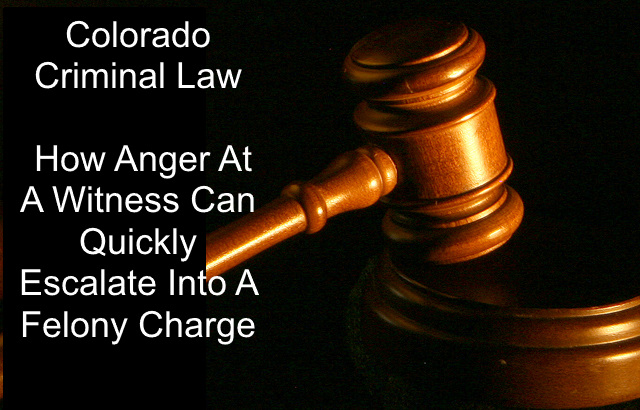
Other Articles of Interest:
- Colorado Criminal Law – How To Testify – How To BE A Witness*
- Rape Shield Law
- Rape Shield Law
- The Hearsay Rule
- Understanding and How To Win a Permanent Restraining Order Hearing in Colorado – Part II












